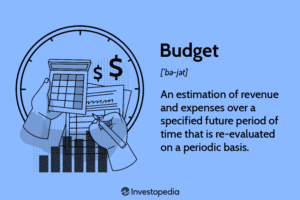1. Introduction
Budgeting is an essential skill that allows you to manage your money effectively and achieve your financial goals. If you’re new to budgeting, these tips will help you get started on the right track and take control of your finances.
2. Understand Your Financial Situation
Begin by understanding your current financial situation. Take stock of your income, including wages, salary, and any additional sources. Calculate your total monthly expenses, including fixed bills, variable expenses, and debt payments. This knowledge will provide a clear picture of your financial standing.
3. Track Your Income and Expenses
Track your income and expenses diligently to gain insights into your spending habits. Use a budgeting app or a spreadsheet to record every transaction. Categorize your expenses to identify areas where you may be overspending.
4. Set Realistic Goals
Define your financial goals based on your values and aspirations. Whether it’s saving for a down payment, paying off debt, or building an emergency fund, set specific and realistic goals. Break them down into smaller milestones to stay motivated.
5. Create a Budget
Design a budget that aligns with your goals and priorities. Allocate your income to different categories such as housing, transportation, groceries, and entertainment. Set limits for each category to ensure you don’t overspend.
6. Prioritize Essential Expenses
Ensure that your budget covers essential expenses like housing, utilities, groceries, and healthcare. These should be your top priorities to maintain a stable and comfortable lifestyle.
7. Cut Back on Discretionary Spending
Identify discretionary expenses that you can reduce or eliminate. Evaluate subscriptions, eating out, entertainment, and impulse purchases. Look for cost-effective alternatives and make conscious choices to limit unnecessary spending.
8. Automate Savings
Make saving a habit by automating your savings. Set up automatic transfers from your checking account to a dedicated savings or investment account. This way, you’ll consistently save without the temptation to spend the money.
9. Review and Adjust Regularly
Regularly review your budget and track your progress. Assess if you’re staying within your spending limits and evaluate if your budget needs adjustments. Life circumstances change, and your budget should reflect these changes accordingly.
10. Seek Support and Accountability
Engage in conversations about personal finance with friends, family, or online communities. Share your goals and progress to gain support and accountability. Consider working with a financial coach or advisor who can provide guidance and help you stay on track.
11. Conclusion
Budgeting is a powerful tool that puts you in control of your finances. By understanding your financial situation, setting realistic goals, and creating a budget that aligns with your priorities, you can achieve financial stability and work towards your dreams.
12. FAQs
Q: Is budgeting only for people with limited income?
A: No, budgeting is beneficial for everyone, regardless of income level. It helps you allocate your resources effectively and make intentional decisions about your money.
Q: How long does it take to see the results of budgeting?
A: The results of budgeting can vary depending on your financial situation and goals. However, with consistency and discipline, you can start seeing positive changes within a few months.
Q: What if I have irregular income?
A: If you have irregular income, it’s essential to budget based on your average monthly income. Build a buffer by saving during months with higher income to cover expenses during leaner months.
Q: What should I do if I overspend in a particular category?
A: If you overspend in a category, evaluate your budget and identify areas where you can make adjustments to compensate for the overage. Look for opportunities to reduce spending in other areas.
Q: Can I make changes to my budget as needed?
A: Absolutely! Your budget is not set in stone. Life changes, and your budget should adapt accordingly. Regularly review and adjust your budget to reflect your current financial situation and goals.
Start your journey to financial success by implementing these budgeting tips. Remember, budgeting is a continuous process that requires patience and discipline. Stay committed to your goals, track your progress, and make adjustments along the way. With time, you’ll gain control over your finances and build a solid foundation for a brighter financial future.





13 thoughts on “Budgeting Tips For Beginners”